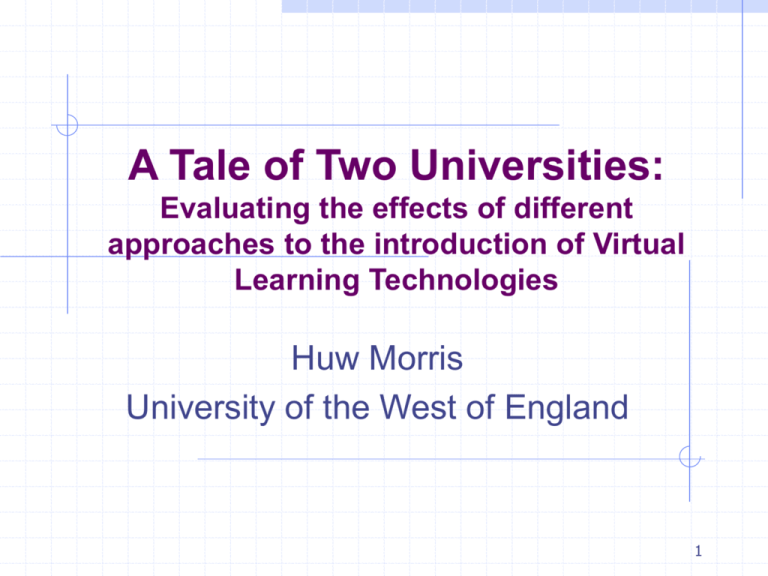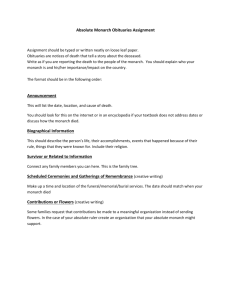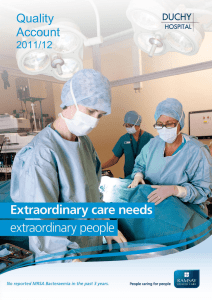Tales from Two Universities
advertisement

A Tale of Two Universities: Evaluating the effects of different approaches to the introduction of Virtual Learning Technologies Huw Morris University of the West of England 1 A Tale of Two Universities It was the best of times, it was the worst of times, it was the age of wisdom, it was the age of foolishness, it was the epoch of belief, it was the epoch of incredulity, it was the season of Light, it was the season of Darkness, it was the spring of hope, it was the winter of despair, we had everything before us, we had nothing before us, we were all going direct to Heaven, we were all going direct the other way (Charles Dickens, A Tale of Two Cities) 2 A Tale of Two Universities Research Approach Institutional Context Leadership and Strategy Structure and Management Support and Development Adoption Process Spread and operation Impact on staff and students Conclusions 3 Research Approach Level Questions Institution level * How was it managed? * What was the VLE used? * What were the links between usage and introduction? Methodology Evaluative case studies:Monarch and Duchy universities Methods Participant observation Semi-structured interviews Usage statistics Online survey in one institution 4 Institutional Context Monarch University Medium sized new university (16,000 students) Based in London Four campuses Six faculties Fair financial position Strong student recruitment Difficulty attracting staff Overall fair competitive position and strengthening Duchy University Large new university (24,000 students) Based in South of England Five campuses Nine faculties Strong financial position Weakening student recruitment Difficulty attracting staff Overall strong competitive position but signs of weakening 5 Leadership and Strategy Monarch University Supported by governors and newly appointed VC & DVC Senior managers active in HEFCE and SRHE but also took study trip to USA Central in successive corporate plans and TL&A strategies Research efforts focused on a few key areas Duchy University Led by middle manager and not by senior team Senior managers active in HEFCE and SRHE but other external links weak Not mentioned in corporate plan or TL&A strategy (19982003). Mixed mention in subsequent documents Main strategic focus on developing research 6 Structure and Management Monarch University Merged Library, IT and media services Separate Educational Development and Educational Technology units No IT director and weak library director at start No requirements placed on local faculty and department managers Broadband in halls of residence Duchy University Library and IT separate departments and no media services No educational development or technology units Strong and effective IT and Library directors Requirements placed on Faculty managers to implement scheme Broadband in halls of residence 7 Support and Development Monarch University Four centrally funded staff in ETU Centrally funded fractional PLs in each faculty No academic staff time allowance Limited staff development Requirement to detail plans in course reviews and validations Student ICT skills development in induction Duchy University Four centrally funded staff in IT department No centrally funded faculty staff Ear marked time allowance in two faculties Extensive staff development Places for discussion No requirement in course reviews and validations Student ICT skills development in induction 8 Adoption Process Monarch University Duchy University 1997-98 Local experiments with WebCT and Blackboard in 1998-99 Geography Institution decides to buy & 1999-2000 roll out Blackboard Student complaints about 2000-01 printing costs University evaluation of 2001-02 Blackboard commissioned 2002-03 2003-04 •Faculties experiment independently with different packages (13 in total) • Cross faculty group shares experiences •Group recommends WebCT •University buys Blackboard •Pilot of Blackboard in all faculties with evaluation • Phase 2 roll out •Institution adopts Blackboard 9 Spread and Operation Monarch University Duchy University Widespread in 5 of 6 faculties 700 of 800 lecturers (88%) Some presence on 1,235 of 1,770 modules (70%) 13,000 regular student users (81%) Announcements and course materials widely used but not other functions Widespread in 6 out of 9 faculties 795 out of 1,093 lecturers (72%) Presence to a minimum standard on 500 of 2,000 modules (25%) Approximately 14,000 regular student users (58%) Announcements and course materials widely used but not other functions 10 Impact on staff and students Advocates Deep and strategic users of a range of resources linked to learning aims and objectives (10 to 20 percent) Ambivalents Surface users of resources on a just-in-time basis (30 to 60 percent) Apathetics Disengaged users pursuing other objectives (20 to 60 percent) Antis Active opponents seeking to undermine operations 11 Conclusions A top down approach can produce rapid increases in the number of modules supported if there is: Top management commitment Appropriate use of benchmarking data Funding of posts and infrastructure A requirement to plan at course level However, this approach may not deal with apathetic staff and students and may provoke resistance 12 Conclusions A bottom-up approach may produce more consistent module presence and limit resistance if there are: Time allowances for development Central and local services to provide training Places for discussion and exchange of views Regular evaluations However this approach may take more time and may not lead to complete coverage 13






